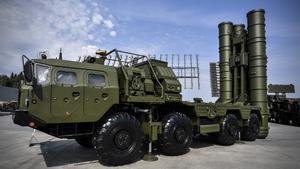 This Aug 22, 2017 file photo shows a Russian S-400 anti-aircraft missile launching system displayed at the exposition field in Kubinka Patriot Park outside Moscow. (ALEXANDER NEMENOV / AFP)
This Aug 22, 2017 file photo shows a Russian S-400 anti-aircraft missile launching system displayed at the exposition field in Kubinka Patriot Park outside Moscow. (ALEXANDER NEMENOV / AFP)
WASHINGTON - The United States on Monday announced sanctions against Turkey for its purchase of the Russian S-400 air defense system.
US Secretary of State Mike Pompeo said in a statement that the measures, which were imposed under the Countering America's Adversaries Through Sanctions Act (CAATSA), includes a ban on all US export licenses and authorizations to Turkey's Presidency of Defense Industries (SSB) and an asset freeze and visa restrictions on its president Ismail Demir and other officers.
Turkey condemned the US sanctions, vowing retaliation for the "unfair" move
According to the statement, Washington had made clear to Ankara "at the highest levels and on numerous occasions that its purchase of the S-400 system would endanger the security of US military technology and personnel and provide substantial funds to Russia's defense sector, as well as Russian access to the Turkish armed forces and defense industry."
ALSO READ: Russian missiles a sideshow in Turkey-US disputes, aide says
"Today's action sends a clear signal that the United States will fully implement CAATSA Section 231 and will not tolerate significant transactions with Russia's defense and intelligence sectors," the statement added.
Turkish Defence Minister Hulusi Akar said on Tuesday US sanctions had shaken all values in their alliance and he called for renewed cooperation between the NATO allies.
“This sanctions decision has shaken all values in our countries’ alliance,” Akar said. “Returning to cooperation and solidarity with the United States ... will provide an important contribution to regional and global peace and security.”
ALSO READ: Erdogan says Turkey tested Russian S-400s, shrugs off US objections
The Foreign Ministry said that Ankara will not refrain from taking measures to ensure its national security.
Iranian Foreign Minister Mohammad Javad Zarif also condemned the sanctions.
"US addiction to sanctions and contempt for international law at full display again," Zarif wrote on social media.
The sanctions would lead to further deterioration in relations between the two NATO allies, which had been fraught over several regional issues such as Syria and the eastern Mediterranean. Pompeo did not meet with any senior Turkish officials during his trip to Turkey last month.
Russian Foreign Minster Sergei Lavrov said the sanctions which the United States has imposed against Turkey were illegitimate and showed arrogance toward international law, Interfax news agency reported.
US media reported that the latest move is a way of preempting a demand in the 2021 National Defense Authorization Act (NDAA), which mandates US sanctions against Turkey over the S-400 purchase within 30 days of the enactment of the bill. A State Department official denied such speculation during a Monday briefing call.
ALSO READ: Turkey clears way to test Russian S-400 defense system this week
A primary US concern is that Russia might collect the stealthy technology and data of the F-35 fighter jets if paired with the S-400 system.
Turkey planned to buy 100 F-35 jets and was a manufacturer for some components for the advanced stealthy fighter jets that the United States and its key allies equipped with. The Trump administration terminated Turkey's involvement with the F-35 program when Ankara began taking the delivery of the S-400 system in July 2019.
Turkish President Recep Tayyip Erdogan confirmed in October that the Turkish army had been testing the S-400 air defense system, drawing condemnation from the United States.
READ MORE: US or Russian missiles, Turkey's testing decision
Russia and Turkey finalized the S-400 air defense system deal worth about US$2.5 billion in 2017, and the delivery was completed in 2019. Turkey is the first NATO member to purchase such a system from Russia.


